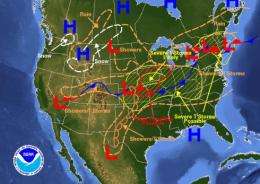What Weathermen Know About Climate Change

Climate change is a topic that impacts the weather not only globally, but also locally. While some people may be concerned about the melting ice sheets at the far corners of the Earth, what most really want to know is "how will global warming affect me?" -- and they often turn to their local weatherperson to find out.
A study released today study by the George Mason University Center for Climate Change Communication in Fairfax, Va., showed that 27 percent of broadcast meteorologists -- who are, according to the National Institutes of Standards and Technology, "often the most visible representatives of science in U.S. households" -- believe that global warming is a scam.
According to the National Science Foundation’s 2010 Science and Engineering Indicators, television is the number one source the public turns to for information about science and technology. Broadcast meteorologists are often the only people at TV news stations with a science background. But the education and experience of those who deliver news about the weather varies dramatically.
"In television, when it comes to weather, there is an extremely wide range of education sets," said Jim Gandy, chief meteorologist at WLTX-TV in Columbia, S.C. "Some have bachelor’s degrees, master’s degrees, and Ph.D.'s, but you also have some without."
When a topic such as climate change comes up in the news, broadcast meteorologists -- no matter what their educational background -- are often thrust into the spotlight. Some embrace the opportunity and try to educate their audiences on the science, while others avoid it at all costs.
"People are uninformed and believe climate change is a hoax," said Gandy. "I occasionally respond to comments posted on our station's website, but you better know your science and get your facts straight before you post on my website."
Some meteorologists surveyed said that there is a lot of conflicting information about climate change.
"Science is about questioning things and I think we should all be in the middle, question the information," said Brad Sowder, First Alert Meteorologist at KOAA-TV in Colorado Springs, Colo. "I have been more on the side of a skeptic."
Another weathercaster who wanted to remain anonymous felt that the topic of climate change is less about the science and more about politics. "Personally, I think that global warming is a political issue, and I feel like it is safer to stay out of it," he said.
The survey also found that 62 percent of broadcast meteorologists want to report more on climate change.
"We have a good comprehensive look at television weathercasters from this survey," said Kris Wilson, a senior lecturer with the School of Journalism at University of Texas at Austin and one of the lead investigators of the survey.
Beginning in July, the next phase of the National Science Foundation-funded study will begin. A test case at Gandy’s station will include 30-second segments in some of the weathercasts to educate viewers about climate change.
"It will be a year-long effort using our resources on-air and on the Internet in an effort to educate the public about climate change past, present, and future," said Gandy. "I wish the public knew how difficult it is to have knowledge of climate science. Simply being a meteorologist is not enough, and this is a mistake that some television meteorologists make."
Source: Inside Science News Service














